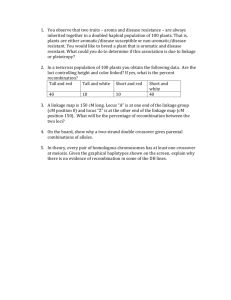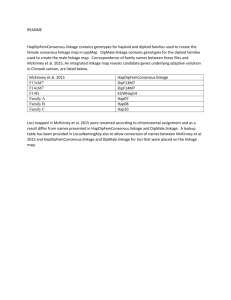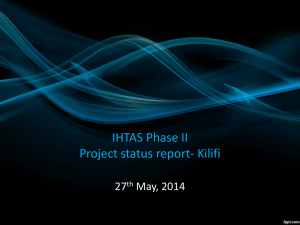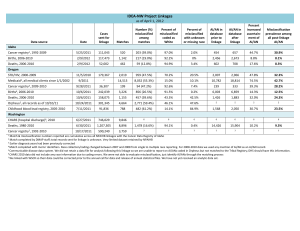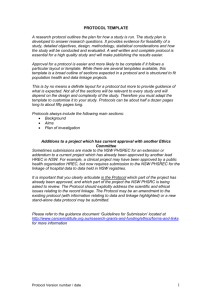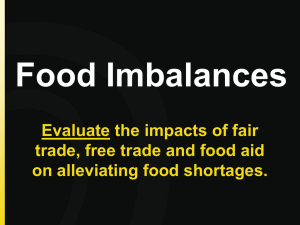NATIONAL FOOD PROCESSING POLICY
advertisement
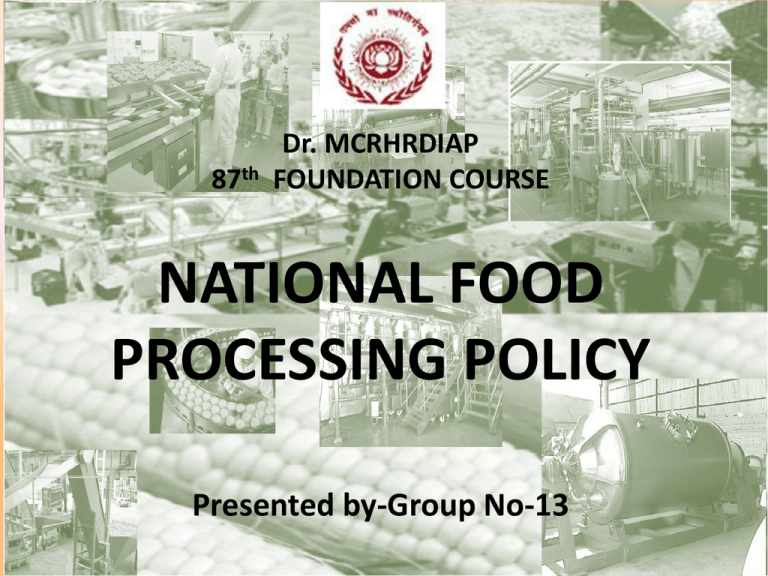
87th Dr. MCRHRDIAP FOUNDATION COURSE NATIONAL FOOD PROCESSING POLICY Presented by-Group No-13 Team Members • • • • • • • • • • Anila Kumari T. Gajendra Soni Mahipal Singh Prasoon Verma Prerna Gupta Pruthvi Raj Sandeep Rana Shiva Prakash Devaraju Swagata Mitra Vaibhav Agarwal What is Food Processing? Food Processing Manufactured Process Transformation of Physical properties Commercial Value of the new Product Other ValueAdded Process Significant Value Addition Why Food Processing Policy? Sr No 1. 2. 3. 4. 5. 6. 7. 8. Crop Cereals Pulses Oil Seeds Fruits & Vegetables Milk Fisheries Meat Poultry Cumulative Wastage (%) 3.9 - 6.0 % 4.3 – 6.1 % 6.0 % 5.8 – 18.0 % 0.8 % 2.9 % 2.3 % 3.7 % Percentage of Losses Estimated for Major Produces Source: A Study by CIPHET, 2010 Producer Why Food Processing Policy? Field Losses (Pest, Diseases, Rodents etc)) Developing Countries – Relatively high losses in the initial parts of the value chain Pre-Processing (e.g. inefficient harvesting, drying) Transport (e.g. spillage, leakage) Storage (e.g. technical deficiencies) Processing & Packaging (e.g. excessive peeling, washing) Consumer Marketing (e.g. spoilage, rotting in stores) Wastage by Consumer (e.g. overeating, food wastage) Field Fork Rich Countries – High losses at a later stage in the food chain Why Food Processing Policy? • Multiplicity of Laws and Regulatory Authorities • Lack of participation of Cooperative Institutions, PRIs and NGOs • Adherence to Quality and SPS Measures under WTO • Little Value Addition in Food Processing Industry–7% • 75% of the Sector comprises of Small Scale & Unorganized sector Salient Features of National Food Processing Policy Creating Enabling Environment Infrastructural Development Backward Linkage Forward Linkage Special Provision Creating Enabling Environment Fiscal Initiatives (Rationalization of Tax Structure) Harmonization & Simplification of Food Laws Market Creation for Processed Food Investment Promotion (Foreign and Domestic) Infrastructural Development Development of Back-End Infrastructure Infrastructure to implement Latest Technologies of the sector Development of Agro Food Parks and Food Processing Training Institutes Backward Linkage Linkage between Farmers and Processors Development of Futures Market Minimize the Gap between Farm-Gate Price and Final Price Forward Linkage Elimination of Intermediaries in the Market Marketing Network Development of Marketing Capabilities Stakeholders Consumers Government Farmers Stakeholders Academic & Research Institutions Cooperatives, NGOs,PRIs Financial Institutions Merits of The Policy Farmers • Better Remuneration • Reduced Risks and Uncertainties • Access to Advanced Technology Consumers • Quality products at Lesser Costs • Increase in Product Varieties Merits of The Policy Infrastructure Development • Pre-processing • Transportation & Warehousing • Post-processsing Research & Development • Industrial Linkage • University Linkage Economic Benefits • Inclusive Growth • Futures Market • Export Promotion Areas of Concern • Transition from Food Crops to Cash Crops – threatening Food Security • Regulation of Foreign Investment in Food Processing Sector • No Provision for Regulation of Processing Units • Failure to Address the issue of Low Credit Availability • Absence of specific provisions for small & marginal farmers Implementation Issues • Large Scale Funding Requirements for Infrastructure Development • Reluctance of Farmers to adapt to the new Environment • Strong Chain of Middle-men • Financial Inclusion issues for the Farmers • Synergy between Center & States Suggestions & Recommendations • Effective Implementation of the Measures suggested in the Policy • Fast & Effective Implementation of GST • Emphasis of 2nd Green Revolution to suit the Food Processing Industry • Incentives for Import of Food-Processing Technologies • Establishment of National Bank (like NABARD) for Food Processing Sector Conclusion National Food Processing Policy is an effective step to vitalize & synergize the linkages between Agriculture & Industry. If it is implemented effectively it will surely lead to food security, overall growth and empowerment of the farmers, consumers and the nation as a whole. Thank You
